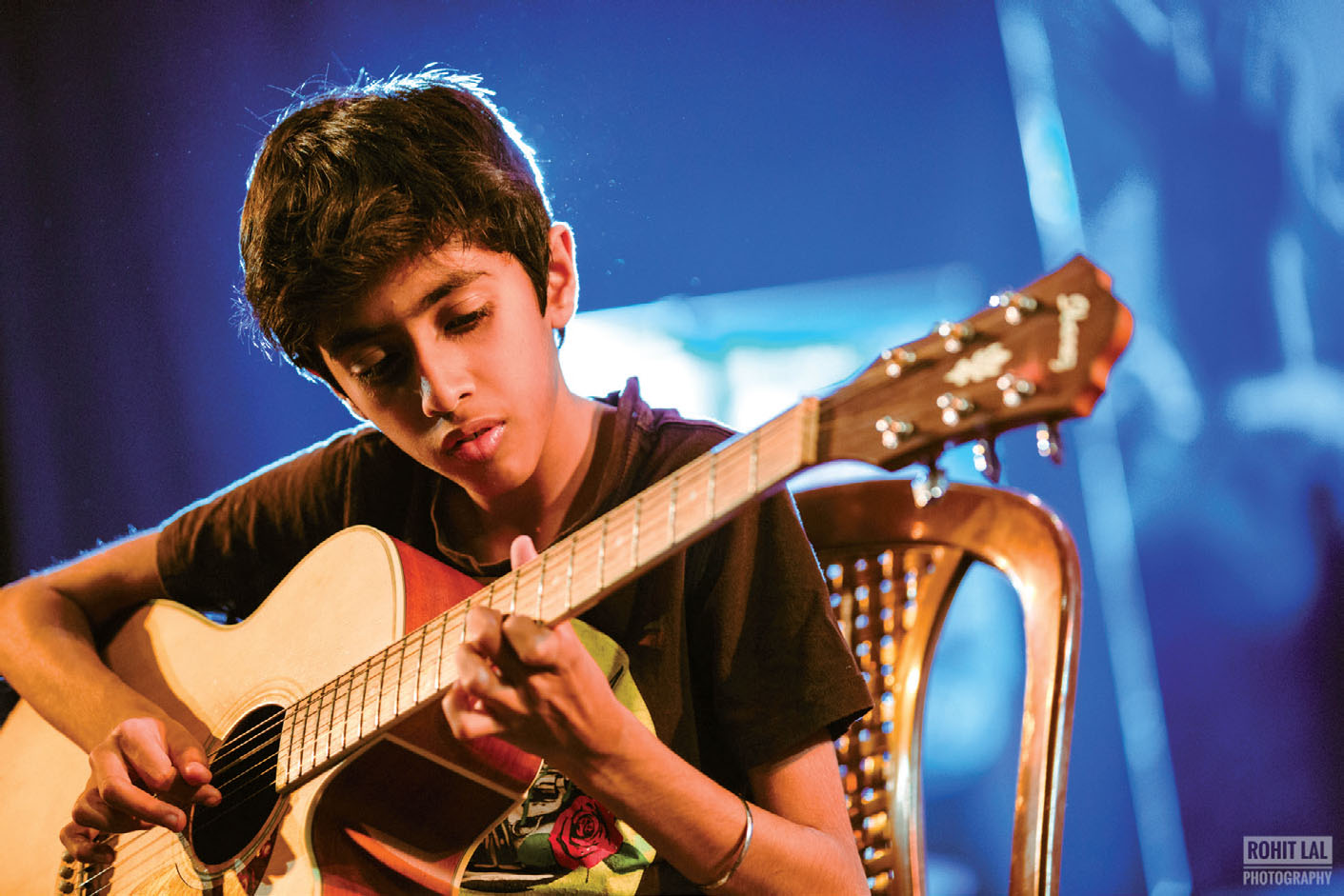
What was your introduction to music?
I remember being obsessed with Thin Lizzy, that was my education really. But the thing which I remember most is going to concerts, and it didn't matter whether it was in a school or a professional concert, rushing to the front of the audience, and turning my back to the stage. I wanted to see what the band could see. It's never really left me.
When did you start being on the stage?
In primary school. It was a bit of a calling. I always wanted to be on the stage side not the dancing side.
Was it always percussion for you?
Yeah pretty much. Again, something of a calling. I was turning all the pots and pans upside down and getting a couple of boxes out. All those clichés but it's true. When I ask students to try different instruments, they know what they like, we all do. For me, drums were an immediate draw. It never felt like a choice to me.
How did your playing develop?
It's mainly drum set. I have branched out into melody within percussion a little but my main professional training and performance to this day is the drum set in a contemporary context. There's still so much to explore – I haven't finished what I started all those years ago yet! There are many ways that I explore melody, harmony, theory and different ways, be that academically, as an examiner or as a school owner so but for me as a performer know very much still drums.
How did being a school owner happen?
When I started out there weren't many educational opportunities, so there was a healthy amount of self-teaching and taking lessons when I could afford it. Then I ended up learning the performance trade through pub and club functions. I was lucky and made a little money and started performing in a few theatres and ended up on a theatre tour. It grew organically and in order to sustain that, I needed to do wider musical work so I went down an academic route. In 2003, I wrote my first drum teaching syllabus, with a view to selling it as lessons. I started teaching in schools and then expanded that into a drum school, which became a music school. I took on different teachers and instrument disciplines and in 2015, we converted into a limited company. We now have 200 weekly students and seven teachers, as well as people doing admin and finance.
I realized that being a drummer wasn't going to sustain me unless I was prepared to be on the road all the time. Once you end up with a wife and children, the realities of life sink in. The academic work gave me some stability but it also improved me as a player.
What started with cardboard boxes and a Thin Lizzy album ended up being my way of making a living and you've just got to widen out as much as you can. It's still continuing. I'm going to start a masters in musicology in September at the University of Canterbury.
That's amazing.
Yeah, it's a cycle. People say it's a ladder and I agree with that to a point that but that implies it's only up or down. In my school I've taken people from beginners to music colleges, and they've come back to teach with me. It's an ongoing dynamic process. I don't want to lose those connections.
When did Rockschool come into the picture?
I had been using its teaching material since the early 2000s and got to know a lot of the people over there. Eventually, they reached out and asked if I wanted to come along and see about becoming an examiner. I trained in London and throughout the country and eventually became an examiner. It's been 10 years since then, during which I've done 10,000 exams across 30 countries and accumulated more air miles than I could even begin to count.
It started purely in the examining role and ended up in a syllabus advisor and a consultancy role. I've been a point of contact for public queries, given advice to the music board on process and content, contributed to lots of publications and new syllabuses – including the diplomas – and helped to devise the theory syllabus.
With examining, do you think there is a risk of reducing a student's interest?
Certainly. I don't believe in the word fail. This isn't just utopian talking. I genuinely see it in terms of the percentage showing where someone is currently at. It's saying: ‘Well done, it wasn't quite enough to get the grade this time so let's keep going’.
It's about how it's presented. I believe in giving good and bad news. I try to help everybody develop and progress. Teachers need just as much help as anyone else, especially if you haven't been formally trained in it. With a lot of contemporary musicians, like myself, it's an extension of income and while it's often done with the best interest, it's not necessarily best practice.
Teachers are under pressure to produce results to justify the money that they're taking from parents. Hence, RSL has the teaching diploma which I was keen to write. It's all about developing teachers and giving them the structure and content that they need to form good lessons, helping everybody who's connected with the process, not just the students.
How does one go about becoming an examiner and what does the role involve?
Apply! If you come from a multi-instrument background. If you are unafraid of self-developing into your non-specialist instrument. If you can resist the tendency to look at the negative more than the positive. If you're happy to be an individual representing the brand. If you are happy to deal with distressed children and overzealous parents and still maintain that RSL smile. If you think that you've got those characteristics and you've got a good Level 4 or more qualification, such as a degree, then please do get in touch. We're still interested if you haven't got those things but from my experience it will be harder for you to succeed. The music is the easy bit. It's managing the process and having the ability to feedback in a sensitive way which is difficult. It's the worst job in the world if you're not ready or right for it. It's the best job in the world if you're happy to be flexible, have a wide background and all the things I've just described. It's a fantastic job that allows you to help so many people. But just apply. We'll tell you if we think you've got what the job needs.
What's been your experience with working all over the world? What similarities and differences do you see?

© Rohit Lal Photography
Interestingly, the profile of results are remarkably similar wherever you go – fairly similar numbers of below passes, passes, merit, distinctions – and you're always going to have mind-blowing candidates across the world and you're also going to have those who really struggle.

Big family: The RSL China conference
Where the difference comes in what the motivation is for doing it. For example, in the UK we have a bias towards Western music. We play what we play. We have students whose parents put them through music lessons because it's something they want their child to experience, even if they never end up as musicians. It's what we perceive as normal. When you're in the middle of Hong Kong or Malaysia or somewhere, you've got students who come in with a grubby guitar and while you don't share a language, they're playing music you're familiar with. The reason why they want to do it, which is so more powerful, is because it represents something that they want to be part of. For example, in Canada a few weeks ago there was a candidate who flew two hours from America to take his exam. That's someone with motivation.
Then there were two guys in India who travelled on a train for two days to do their exam, they got their certificate and spent another two days on a train going home. They wanted it so much. They wanted to have access to something that we take for granted. It's on our doorstep, it's in our psyche. But when you're in the middle of India, it's harder to access and they jump at the chance when it arises.
I experience more of that when I'm abroad and it demands empathy and a desire to help to share those moments. When you do it right, you give them another burst of motivation to keep going. I love it. It's great.
Anything else to add?
I would encourage anybody who is young and drumming and wanting to make a living in drumming to think bigger and wider. If you're going to go into teaching, please go into teaching with a capital T. Take advice on how to teach, on how to set up a business, how to deal with income and cash flow and profit and paying tax. Don't just go and do it because it's to do with drums. You must get the wider facets in place. The other thing I'd say about drumming is that if you are performing, it doesn't matter how well you play, it's about being reliable. It's not about you. There's moments and pockets for you to emerge but the rest of the time you've got to play the music and be musically mature. That's my advice to the young drummer. Also, smell good, wear decent shoes and always buy the first pint!








